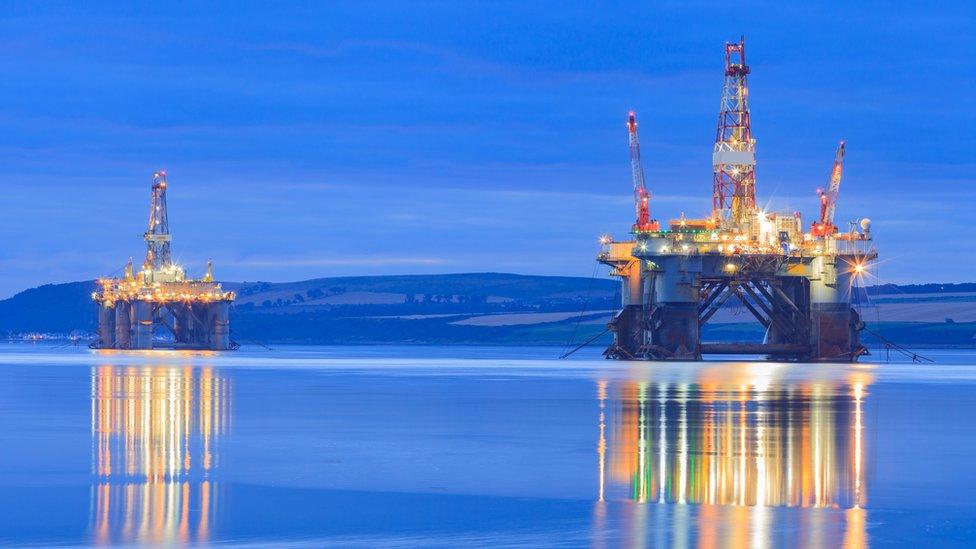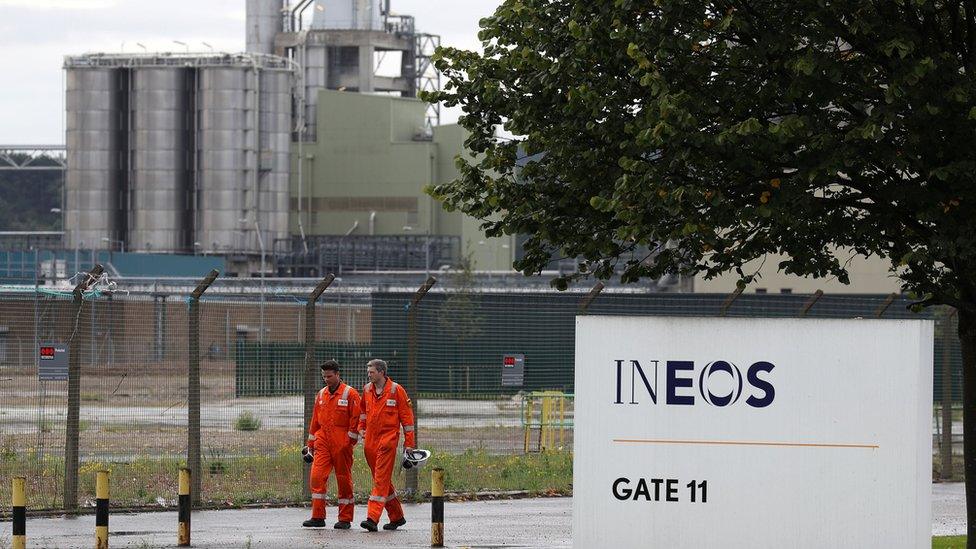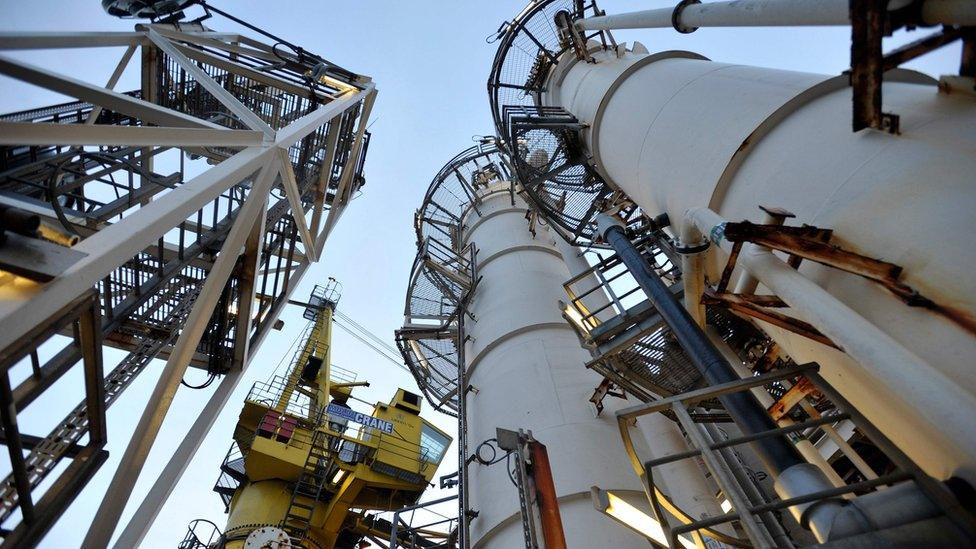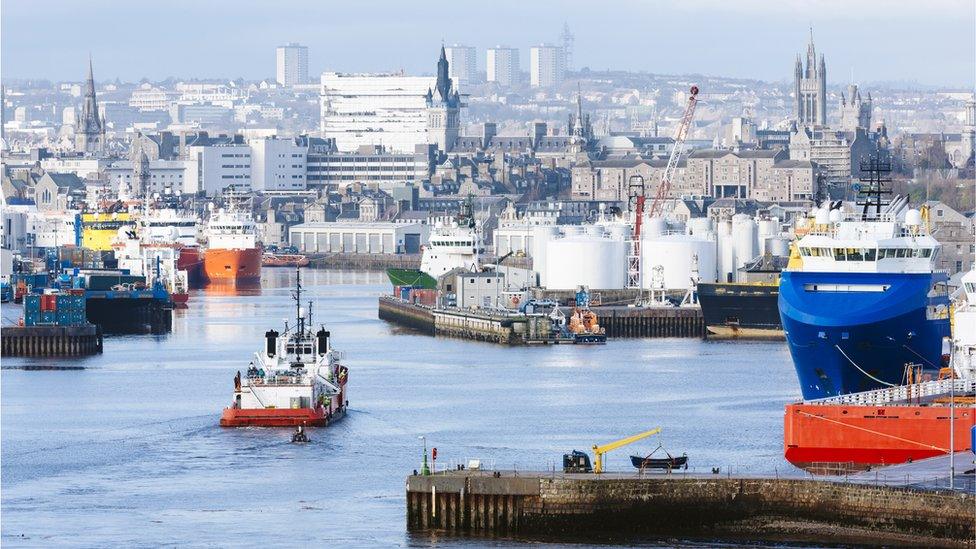North Sea oil: sealing deals
- Published

In the storm-tossed business waters off the coast of Scotland, there's always a deal brewing, or one's just passed by.
Recently, the pace has picked up, as sellers of offshore oil and gas assets - meaning hydrocarbon reserves and the equipment with which to extract them - strike deals with willing buyers.
That's after some unwilling sellers had to offload assets over recent years, in conditions of financial distress.
This week has brought closure to two landmark deals. Shell has transferred a big portfolio of producing assets from some big North Sea fields. For $3.8 billion, Chrysaor gets a 7% share of current UK production.
And BP has sold the Forties Pipeline Network, with the Kinneill terminal, to Ineos. It carries 40% of North Sea oil and gas production, from 85 installations.

That's after Ineos took over Dong Energy's UK assets in September, thus integrating from upstream through the most important pipeline for the central and northern sections of the North Sea, and into the Ineos refining and processing plants at Grangemouth - also previously owned by BP.
(Ineos has also just announced expansion of its fracking potential in Yorkshire and the English East Midlands, buying from Total.)
Sticky oil prices
Why now? The return of The Deal follows something of a hiatus. The decline in the oil price, beginning just over three years ago, meant asset prices plunged.
Finding a floor for those prices has taken time. Not only did Brent crude remain volatile until recent months (it's now crept above $60 for the first time this year), but some big corporate losses brought on a sea-change in industry behaviour.

This was forced on it both by tough business conditions and by the UK government. It installed a new Aberdeen-based regulator, the Oil and Gas Authority, with toughened powers to align companies' production strategies with the national interest in extracting, in the jargon, Maximum Economic Recovery. (Some say the national and global interest would be better served by minimising it.)
In co-ordinated action and under pressure from the regulator, the industry has made drastic cuts to its cost base. The cost of producing the average barrel of oil in UK waters has nearly halved since the price of Brent crude plunged.
Rather than sell the assets mid-way through the process, sellers have tended to delay long enough to get the benefits of implementing the cost cutting.
Also, as in any downturn in asset prices, including house prices, it takes a while for sellers to adjust their expectations of what they can expect to get. That makes deals much stickier.
Marginal and mature
There are other factors behind the deal-making. Companies have internal battles over capex. Capital budgets are always scarce. Regional divisions within multinationals have to fight for a share.
And as the UK North Sea has become a much less profitable place to operate in recent years, those who represent the oil majors in Aberdeen have had more of a struggle to secure the investment funds needed to develop existing and new fields.
So they keep reviewing their portfolio of assets. And while they go after new fields in deeper water west of Shetland, and new basins around Africa, in the Gulf of Mexico, Mediterranean, Russia and the Arctic, new, smaller, more nimble investors are moving in to mop up the more marginal, mature fields of the North Sea.
The buyers must have an idea of how they can operate them more efficiently, probably through lower costs, and particularly lower overheads.
And private equity has become a bigger player. Funds set up to invest private equity in energy have engaged with the oilfield services sector for around 15 years. They've invested in assets, such as pipelines and terminals.

Cost cutting has hit Aberdeen hard but production costs are now much lower
Now, they're going after the oil and gas reserves themselves (alongside petroleum engineers, you'll be relieved to hear). They will only do so if they have a clear plan for investing, extracting and exiting the investment.
Exiting has been a trickier process than in any other sector, apart from nuclear energy. Decommissioning of offshore assets carries enormous liabilities, with complex tax implications.
According to those who advise on such deals, the decom clauses have become more sophisticated. Sellers have realised they have to concede some continuing liability for the future costs.
One deal eight years ago involved an oil company taking back the full liability once production ceased. They are more often shared now, with clauses dependent on costs and the oil price over the remaining production years.
Although Shell and BP have been the sellers this week, they say they're committed to the UK offshore sector. They remain among five oil majors still operating in UK waters, though increasingly focused west of Shetland. As non-British firms, Total, Chevron and ExxonMobil have a lower profile.
The North Sea is mature, but as oil people emphasise, it's not dead yet.